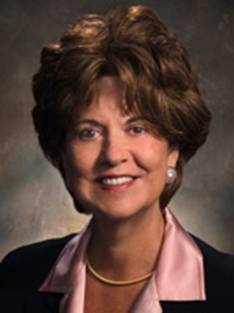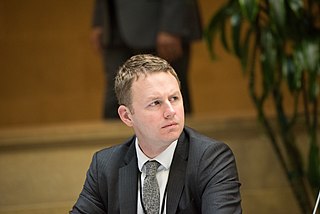
The Philadelphia City Council, the legislative body of Philadelphia, Pennsylvania, consists of ten members elected by district and seven members elected at-large. The council president is elected by the members from among their number. Each member's term is four years, and there are no limits on the number of terms a member may serve.
The Scott Trust Limited is the British company that owns Guardian Media Group and thus The Guardian and The Observer as well as various other media businesses in the UK. In 2008, it replaced the Scott Trust, which had owned The Guardian since 1936.
Levonorgestrel-releasing implant, sold under the brand name Jadelle among others, are devices that release levonorgestrel for birth control. It is one of the most effective forms of birth control with a one-year failure rate around 0.05%. The device is placed under the skin and lasts for up to five years. It may be used by women who have a history of pelvic inflammatory disease and therefore cannot use an intrauterine device. Following removal, fertility quickly returns.

The Pew Charitable Trusts is an independent non-profit, non-governmental organization (NGO), founded in 1948.
The Pew Research Center is a nonpartisan American think tank based in Washington, D.C. It provides information on social issues, public opinion, and demographic trends shaping the United States and the world. It also conducts public opinion polling, demographic research, random sample survey research, and panel based surveys, media content analysis, and other empirical social science research.

The Population Council is an international, nonprofit, non-governmental organization. The Council conducts research in biomedicine, social science, and public health and helps build research capacities in developing countries. One-third of its research relates to HIV and AIDS; while its other major program areas are still linked to its early foundation in reproductive health and its relation to poverty, youth, and gender. For example, the Population Council strives to teach boys that they can be involved in contraceptive methods regardless of stereotypes that limit male responsibility in child bearing. The organization held the license for Norplant contraceptive implant, and now holds the license for Mirena intrauterine system. The Population Council also publishes the journal Population and Development Review, which reports scientific research on the interrelationships between population and socioeconomic development. It also provides a forum for discussion on related issues of public policy and Studies in Family Planning, which focuses on public health, social science, and biomedical research involving sexual and reproductive health, fertility, and family planning.

Hormonal contraception refers to birth control methods that act on the endocrine system. Almost all methods are composed of steroid hormones, although in India one selective estrogen receptor modulator is marketed as a contraceptive. The original hormonal method—the combined oral contraceptive pill—was first marketed as a contraceptive in 1960. In the ensuing decades, many other delivery methods have been developed, although the oral and injectable methods are by far the most popular. Hormonal contraception is highly effective: when taken on the prescribed schedule, users of steroid hormone methods experience pregnancy rates of less than 1% per year. Perfect-use pregnancy rates for most hormonal contraceptives are usually around the 0.3% rate or less. Currently available methods can only be used by women; the development of a male hormonal contraceptive is an active research area.

Harold FitzGerald "Gerry" Lenfest was an American lawyer, media executive, and philanthropist. Lenfest, along with his wife Marguerite, were among the most prominent Philadelphia-based philanthropists in his last two decades, donating more than $1.3 billion to 1,100 groups, supporting various educational, artistic, journalistic, and healthcare causes.
Tom Ferrick, Jr. (1949) is an editor, reporter and columnist long active in print and web journalism in Philadelphia. Until 2013, he was senior editor of Metropolis, a local news and information Web site based in Philadelphia that he founded in 2009. Prior to that, he was a reporter, editor and columnist for The Philadelphia Inquirer. After being a columnist there since 1998, he left the newspaper in 2008. He has spent nearly 40 years as a journalist, focusing mostly on government.
Tom Rosenstiel is an American author, journalist, press critic, researcher and academic. He is the Eleanor Merrill Visiting Professor on the Future of Journalism at the Philip Merrill College of Journalism at the University of Maryland. He was for the previous nine years the executive director of the American Press Institute. He is also a non-resident senior fellow at the Brookings Institution. Rosenstiel was founder and for 16 years director of the Project for Excellence in Journalism (PEJ), a research organization that studies the news media and is part of the Pew Research Center in Washington, D.C. His first novel, Shining City, was published by Ecco of HarperCollins in February 2017 and his second, "The Good Lie," in 2019.

A contraceptive implant is an implantable medical device used for the purpose of birth control. The implant may depend on the timed release of hormones to hinder ovulation or sperm development, the ability of copper to act as a natural spermicide within the uterus, or it may work using a non-hormonal, physical blocking mechanism. As with other contraceptives, a contraceptive implant is designed to prevent pregnancy, but it does not protect against sexually transmitted infections.

Margaret Ann "Peggy" Hamburg is an American physician and public health administrator, who is serving as the chair of the board of the American Association for the Advancement of Science (AAAS) and co-chair of the InterAcademy Partnership (IAP). She served as the 21st Commissioner of the U.S. Food and Drug Administration from May 2009 to April 2015.
Sheldon Jerome Segal was an American embryologist and biochemist who spent his entire career working on contraception, and made major innovations in the field of long-lasting alternatives, with Chilean physician Horacio Croxatto, including in the creation of Norplant, the first major development advance in birth control since the birth control pill.

Rosemarie Greco began her career in the financial services industry as a bank-branch secretary; rising to be one of the highest-ranking woman in banking in the United States. She currently is co-chairwoman of VISION 2020, a national initiative for women's economic and social equality that works with affiliated organizations to advance issues important to women.
The Fred M. Hechinger Grand Prize for Distinguished Education Reporting is the United States' top annual prize for journalism about education. It has been awarded each year since 1972 by the Education Writers Association, the national group for reporters and editors who cover education issues. The Hechinger Prize is awarded to the top work of journalism among the first-place winners in the association's annual National Awards for Education Reporting.
Patrick Timothy Harker is the President of the Federal Reserve Bank of Philadelphia. Harker previously served as the President of University of Delaware. He was the dean of the Wharton School of the University of Pennsylvania from 2001 to 2007. He began his presidency of the University of Delaware in 2007 and resigned in 2015.

Paul Winfree was Deputy Assistant to the President for Domestic policy, Deputy Director of the Domestic Policy Council, and Director of Budget Policy in the Trump administration. He was also formerly the distinguished fellow in economic policy and public leadership at The Heritage Foundation. In addition, he was director of the Thomas A. Roe Institute for Economic Policy Studies and the Richard F. Aster Fellow at The Heritage Foundation. Winfree was Chair of the Fulbright Foreign Scholarship Board from 2020 until 2022.
Acel Moore was a long-time reporter, columnist, and editor for The Philadelphia Inquirer. Moore won a Pulitzer Prize in 1977. He was among the first Black journalists hired at the Inquirer.

Benjamin R. Waxman is an American journalist, progressive activist and politician. He is the Representative for District 182 of the Pennsylvania House of Representatives. Waxman previously served as an editorial writer for The Philadelphia Daily News and a reporter for WHYY-FM and as a political aide to State Senator Vincent Hughes and Philadelphia District Attorney Larry Krasner.









